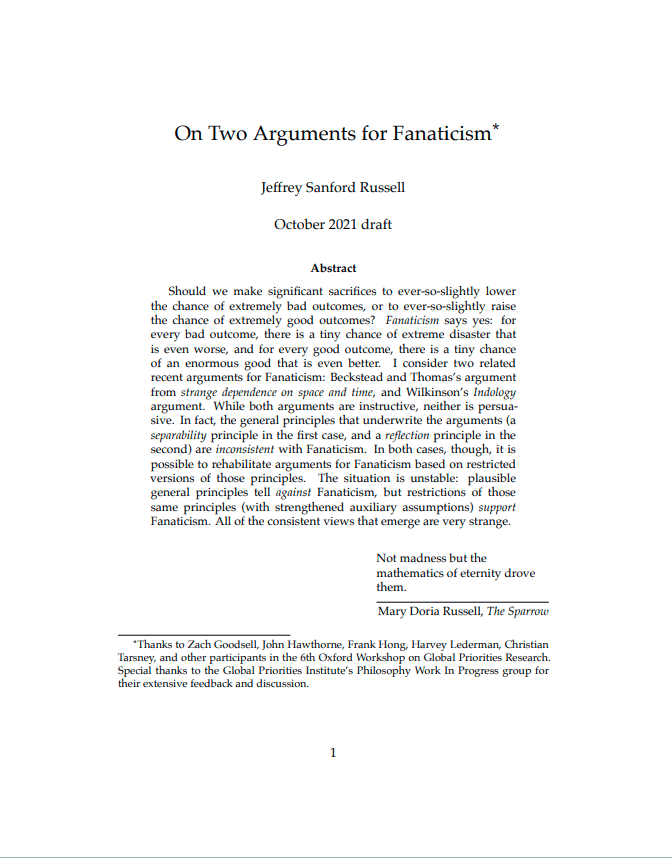On two arguments for Fanaticism
Jeffrey Sanford Russell (University of Southern California)
GPI Working Paper No. 17-2021, published in Noûs
Should we make significant sacrifices to ever-so-slightly lower the chance of extremely bad outcomes, or to ever-so-slightly raise the chance of extremely good outcomes? Fanaticism says yes: for every bad outcome, there is a tiny chance of extreme disaster that is even worse, and for every good outcome, there is a tiny chance of an enormous good that is even better. I consider two related recent arguments for Fanaticism: Beckstead and Thomas’s argument from strange dependence on space and time, and Wilkinson’s Indology argument. While both arguments are instructive, neither is persuasive. In fact, the general principles that underwrite the arguments (a separability principle in the first case, and a reflection principle in the second) are inconsistent with Fanaticism. In both cases, though, it is possible to rehabilitate arguments for Fanaticism based on restricted versions of those principles. The situation is unstable: plausible general principles tell against Fanaticism, but restrictions of those same principles (with strengthened auxiliary assumptions) support Fanaticism. All of the consistent views that emerge are very strange.
Other working papers
A paradox for tiny probabilities and enormous values – Nick Beckstead (Open Philanthropy Project) and Teruji Thomas (Global Priorities Institute, Oxford University)
We show that every theory of the value of uncertain prospects must have one of three unpalatable properties. Reckless theories recommend risking arbitrarily great gains at arbitrarily long odds for the sake of enormous potential; timid theories recommend passing up arbitrarily great gains to prevent a tiny increase in risk; nontransitive theories deny the principle that, if A is better than B and B is better than C, then A must be better than C.
How much should governments pay to prevent catastrophes? Longtermism’s limited role – Carl Shulman (Advisor, Open Philanthropy) and Elliott Thornley (Global Priorities Institute, University of Oxford)
Longtermists have argued that humanity should significantly increase its efforts to prevent catastrophes like nuclear wars, pandemics, and AI disasters. But one prominent longtermist argument overshoots this conclusion: the argument also implies that humanity should reduce the risk of existential catastrophe even at extreme cost to the present generation. This overshoot means that democratic governments cannot use the longtermist argument to guide their catastrophe policy. …
The evidentialist’s wager – William MacAskill, Aron Vallinder (Global Priorities Institute, Oxford University) Caspar Österheld (Duke University), Carl Shulman (Future of Humanity Institute, Oxford University), Johannes Treutlein (TU Berlin)
Suppose that an altruistic and morally motivated agent who is uncertain between evidential decision theory (EDT) and causal decision theory (CDT) finds herself in a situation in which the two theories give conflicting verdicts. We argue that even if she has significantly higher credence in CDT, she should nevertheless act …

